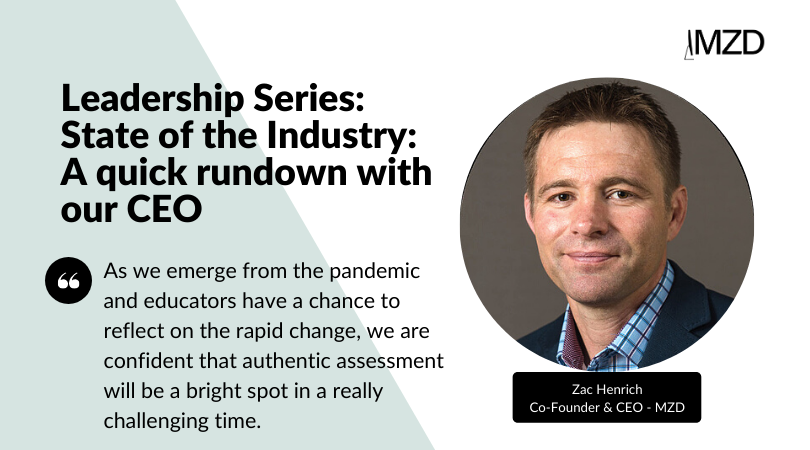Over the next few weeks we’ll be chatting with our leadership team about the state of the assessment industry today, as well as what might be coming around the corner. First up is our Co-founder and CEO.
Zac Henrich is the CEO of MZD. In 2015 Zac and co-founder Miles Loring created MZD with a mission and passion for developing technology solutions that make performance assessment possible for organizations of all sizes.
Prior to MZD Zac played key roles in organizations such as Pearson, ACT, and Parcc Inc. This week, we’ve been talking to Zac about navigating unprecedented times and MZD’s plans for the future.
What do you think every ed-tech company should be focusing on now more than ever?
At MZD we obviously believe that ed-tech, especially assessment focused organizations, should be developing solutions that give students the opportunity to showcase their knowledge and skills in ways that align with the real world. At a more macro level I strongly believe the industry should be focusing on simplicity. We should continuously be asking ourselves How do we make it easier for students or candidates to interact with assessments? And How do we remove friction for the folks administering assessments?
Companies should work with clients during implementation to ensure using their tool is simple for all stakeholders. This often requires recommendations and examples of what not to do, it’s not always the quickest path, but no one wins if the end-users give up on a tool because of extra steps or a process that doesn’t add value to them or their learners.
What do you think is the biggest technology challenge for teachers and administrators?
Teachers and administrators are now working simultaneously in two vastly different environments. The biggest challenge will be finding and utilizing technology that is simple to use and effective in both virtual and in-person environments.
In the recent past technology has been blamed for increased isolation and preventing students from connecting with their peers and building actual relationships. In the current environment using technology might be the only way students are able to “see their friends”. The technology challenge will be finding ways to connect students virtually or in-person in environments that simulate the real world. Working with virtual project teams and using online collaboration to create authentic work is not new in the workplace but figuring out how to replicate that in K-12 classrooms is not a trivial task. Employers have the benefit of hiring based on desired skill sets, that is not the case for teachers and we will have to find ways to ensure all students are developing these skill sets while still learning valuable content.
What does the future of authentic assessments look like?
For some time I think we have settled for measures of knowledge and skills that are at least one step removed from life after school. Multiple choice assessments have traditionally been easier to administer, score and report on and they generally produce results that have validity. But if we cannot control the environment in which assessments are taken that validity quickly erodes.
Authentic assessments are not only a better measure of 21st-century skills, the mode of delivery and the environment the tasks are completed in have less of an impact on the validity of the results.
As remote learning becomes more of the norm, the impact of authentic assessments becomes even greater. When students are asked to create authentic work it creates an “assessment’’ where cheating becomes very difficult, collaboration with classmates is encouraged and technology has removed barriers that previously prevented the ability to implement at scale and score this type of assessment.
As we emerge from the pandemic and educators have a chance to reflect on the rapid change, we are confident that authentic assessment will be a bright spot in a really challenging time.
What is your outlook for MZD?
Considering the hand 2020 has dealt everyone, we feel extremely fortunate at MZD. We have had our share of setbacks but our solutions are very well aligned to meet the needs of the ever-changing education landscape. The pandemic has allowed us the chance to form partnerships with organizations that we may not have had otherwise. We are working on several new opportunities that we are very confident about. The future is bright at MZD.


